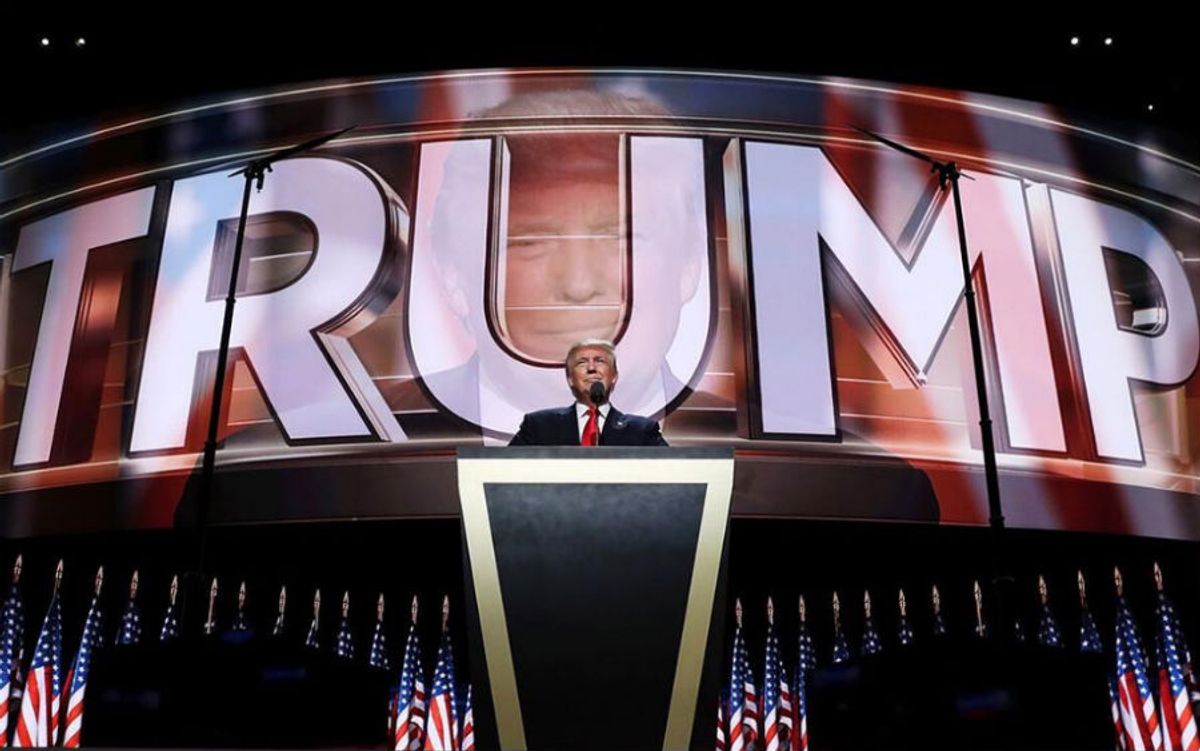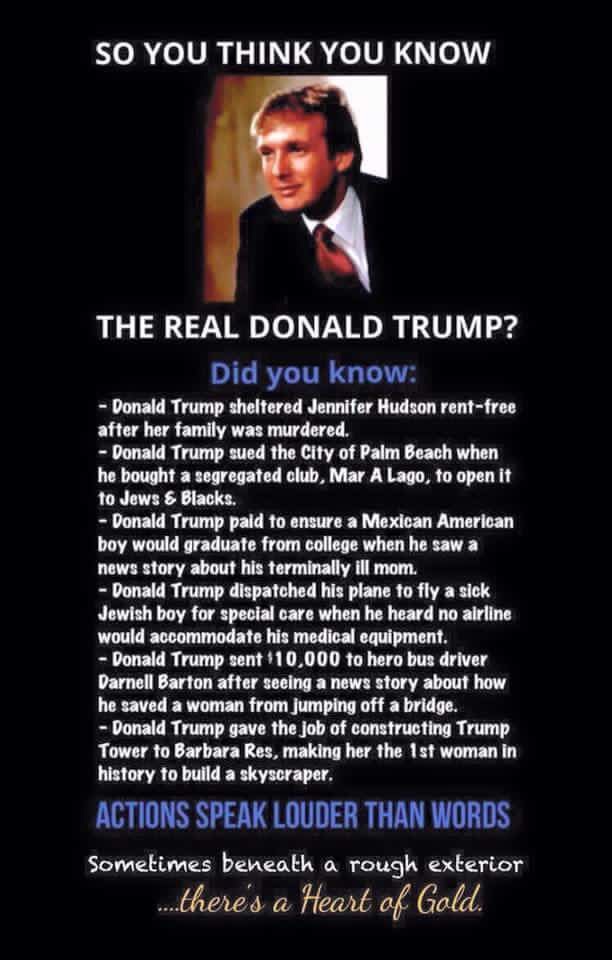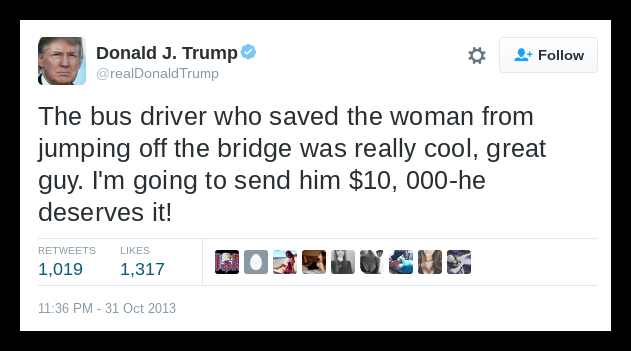In July 2016, an image listing some of the good deeds accomplished by Donald Trump was widely circulated on social media as a response to criticisms that the Republican presidential candidate was racist, sexist or elitist:
Here is our examination of the claims contained within that image:
POSSIBLY TRUE: Donald Trump sheltered Jennifer Hudson rent-free after her family was murdered.
Tragedy struck the family of Jennifer Hudson in October 2008, when her mother, brother, were murdered, whereupon the Oscar-winning actress returned home to Chicago and took a room at the Trump International Hotel Tower. According to contemporaneous reports, Trump offered up a hotel suite to Hudson and her family and picked up their tab for their stay. However, all such reports stemmed from a single source, a statement Trump himself made to People magazine; given Trump's penchant for exaggeration and self-promotion, we wouldn't put this one in the "TRUE" column without additional confirmation.
MIXTURE: Donald Trump sued the City of Palm Beach when he bought a segregated club, Mar A Lago, to open it to Jews & blacks.
The battle between Donald Trump and the City of Palm Beach over the Mar-A-Lago estate is a long and complicated one, beginning with Trump's claim that he drove the price of the estate down by threatening to block its beachfront view:
Trump wanted [Mar-A-Lago] to be his.
So, according to Trump, when his first offer of $28 million was turned down, he decided to play hardball. He said he bought the beachfront property directly in front of it through a third party and threatened to put up a hideous home to block its ocean view, he recalled in the interview.
"That was my first wall," he said. "That drove everybody nuts. They couldn't sell the big house because I owned the beach, so the price kept going down and down."
In the end, Trump bought the landmark in 1985 for a bargain, paying $5 million for the house and $3 million for [its] antiques and lavish furnishings.
Trump had Mar-a-Lago's hedge on South Ocean Drive chopped down to ensure passersby could see his castle.
But Trump didn't literally buy a "segregated club," as when he purchased Mar-a-Lago in 1985 it was a private estate and not a club. It wasn't until the 1990s that Trump sought to convert the property into a private club, whereupon the town council imposed a series of restrictions upon his plans. Those restrictions didn't require that Trump operate a segregated club; rather, Trump battled those restrictions, in part, by making the point that it was unseemly for the town to impose greater restrictions upon his plans to open an integrated club than they did upon existing segregated clubs:
The town council, seeing Trump as an ostentatious outsider, handed him a list of restrictions as he sought to transform the property in the 1990s. Membership, traffic, party attendance, even photography — all would be strictly limited.
But Trump undercut his adversaries with a searing attack, claiming that local officials seemed to accept the established private clubs in town that had excluded Jews and blacks while imposing tough rules on his inclusive one.
Trump's lawyer sent every member of the town council copies of two classic movies about discrimination: A Gentleman's Agreement, about a journalist who pretends to be Jewish to expose anti-Semitism, and Guess Who's Coming to Dinner about a white couple's reaction to their daughter bringing home a black fiance.
The move infuriated council members, who said it was a distraction from their concerns that Trump's club would spoil a quiet street. But, in time, Trump got most of the restrictions lifted.
"He won in the court of public opinion," said Jack McDonald, who was a council member at the time and who went on to be mayor and to join Mar-a-Lago.
Town council member Allen Wyett opined that Trump's nondiscriminatory policy at the club was more of a business decision than a social one:
Wyett, who is Jewish, said he would hear Trump talk with pride about Mar-a-Lago’s nondiscriminatory policy, but wondered if it was a business strategy: “Was he smart enough to realize that Palm Beach is about 40 percent Jewish and he was not going to attract the old guard anyway?”
MIXTURE: Donald Trump paid to ensure a Mexican-American boy would graduate from college when he saw a news story about his terminally ill mom.
This statement about Trump and a Mexican-American boy refers to Melissa Young, a former beauty pageant contestant and Miss Wisconsin USA in 2005, who told Trump during a campaign stop on 30 March 2016 that she was suffering from a terminal illness. Although Young later thanked Trump for his support and said that he had enabled her young Mexican-American son to go to college, she was referring to donations made through Fundanything.com, a Kickstarter-like crowdfunding site launched by Trump, and not a personal contribution from the candidate:
As my body is getting weaker, I am unsettled by the fact that I have never been able to directly thank you. Because of you and your efforts, my son Jack who is Mexican-American, has a chance at a better future and a solid education. You and the Miss USA pageant played a tremendous role in my life.
About 3 years ago, Chelsea was in NYC and attended one of your many functions at Trump Tower, where you debuted FundAnything.com. This turned out to be a life changing event for my son and I. I am forever indebted to you.
During the site's launch Trump reportedly promised he would fully fund some FundAnything projects himself, but we found nothing indicating he had personally funded Young's endeavor.
TRUE: Donald Trump dispatched his plane to fly a sick Jewish boy for special care when he heard no airline would accommodate his medical equipment.
This statement refers to an incident that occurred in 1988, when 3-year-old Andrew Ten and his parents could not get a flight from California to New York for seek medical treatment for the boy. When Andrew's parents asked to use Trump's private jet, the Republican Presidential candidate reportedly said "yes, I'll send my plane out," without hesitation.
A more in-depth examination of this story was published as a separate article on this site.
TRUE: Donald Trump sent $10,000 to hero bus driver Darnell Barton after seeing a news story about how he saved a woman from jumping off a bridge.
In November 2013, bus driver Darnell Barton took a detour from his normal route in order to stop a woman from jumping off an overpass. Trump said he was moved by the gesture and promised to reward Barton with a $10,000 check:
According to the Buffalo News, Trump followed through on his promise, and on 7 November 2013 Mayor Byron W. Brown delivered a check for $10,000 from the real estate mogul to Barton at a City Hall ceremony:
Donald J. Trump wasn’t there himself.
But in the well-appointed office of Mayor Byron W. Brown, a check for $10,000 from the real estate mogul was presented to the hero bus driver who brought a woman on the brink of suicide to safety.
“Although I know to you it was just a warm-hearted first response to a dangerous situation,” Trump wrote to Darnell J. Barton, “your quick thinking resulted in a life being saved, and for that you should be rewarded.”
TRUE: Donald Trump gave the job of constructing Trump Tower to Barbara Res, making her the 1st woman to build a skyscraper.
Donald Trump did assign Barbara Res a role as vice president in charge of construction of Trump Tower, and she became the first woman credited with leading a skyscraper project (although Res suggested that one of the reasons Trump chose her was for the publicity value her hiring would generate):
There were bragging rights that came with hiring her, (Res) says, and Trump “was quoted lots of places saying he’d hired the first woman to build a big skyscraper.” There were publicity bursts too, like the cover of Savvy Woman, with its very pre-Clarence-Thomas-hearing photos of women executives posing in some fairly unexecutive-like ways.
In a February 2016 New York Daily News opinion piece, Res offered that Trump was not a pleasant person to work for, but that whatever his (apparent) outward failings might be, he was fair in his hiring of women when he thought they were best qualified for the job at hand:
Donald Trump has been telling voters he is not a sexist, does not discriminate against women and will be "great for women" as President. As proof of this, he points to his hiring of a woman to oversee the construction of Trump Tower in 1980, when there were a very few women in construction.
I was that woman.
My view on his statement, and his candidacy more generally, in light of my experiences working directly for him and his then-wife Ivana: Even though he just went out of his way to repeat a pejorative reference to female anatomy to describe Ted Cruz, Trump is not as bad as he sounds. But he's a lot worse than he says.
Trump will tell you that everyone likes him. This is not the case. He can be very charming and ingratiating, but he is not nice. In my experience, he is nasty to the people who work for him. He can be very abusive and curt. He has an incredible temper and he lashes out at everyone, including [his daughter] Ivana.
He has his fixed idea of how women work. He also used to have fixed ideas about certain nationalities, such as who are the best with money, who are the sternest masters, who are the cleanest. Just reflecting society — he profiled, but didn't discriminate. He would always hire the person he thought was best without regard to gender. I know I never got a break like the one I got from Donald.
Every employer I have ever worked for has considered me in terms of my gender. I would say that in that way, Trump was the best of them.
He leered at attractive female employees. Yet I would call him more of a womanizer than a sexist, sort of like Bill Clinton. Trump says he loves women and I suspect he does, in his own way. But his public denigration of women and his association with objectifying activities like Playboy and pageants have the overall effect of blunting any assertion that he is not sexist, regardless of how many women Trump has hired.



